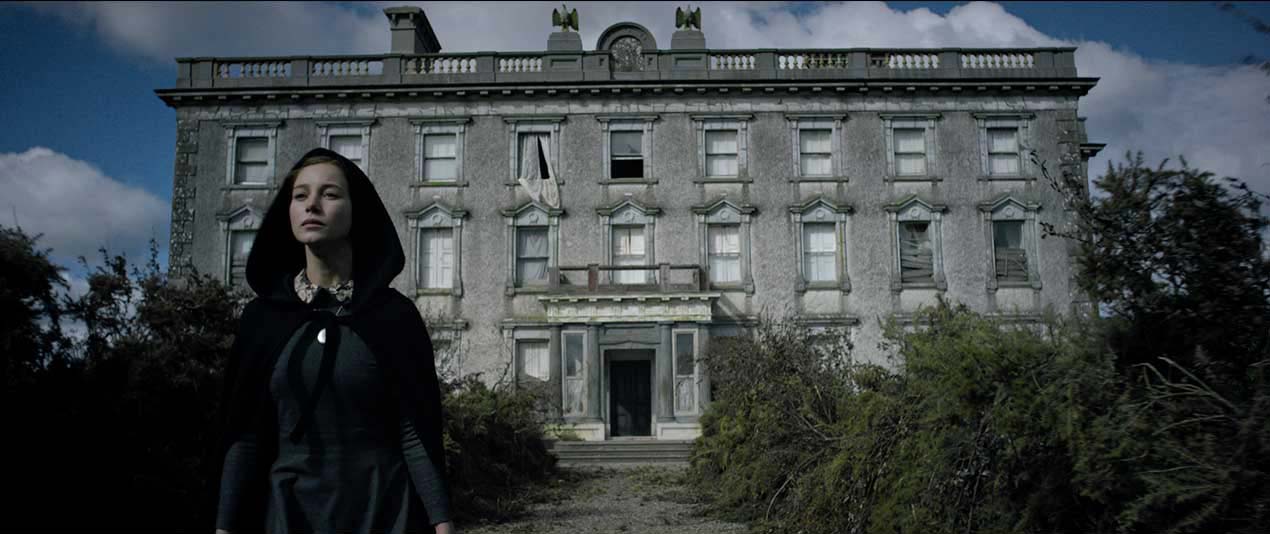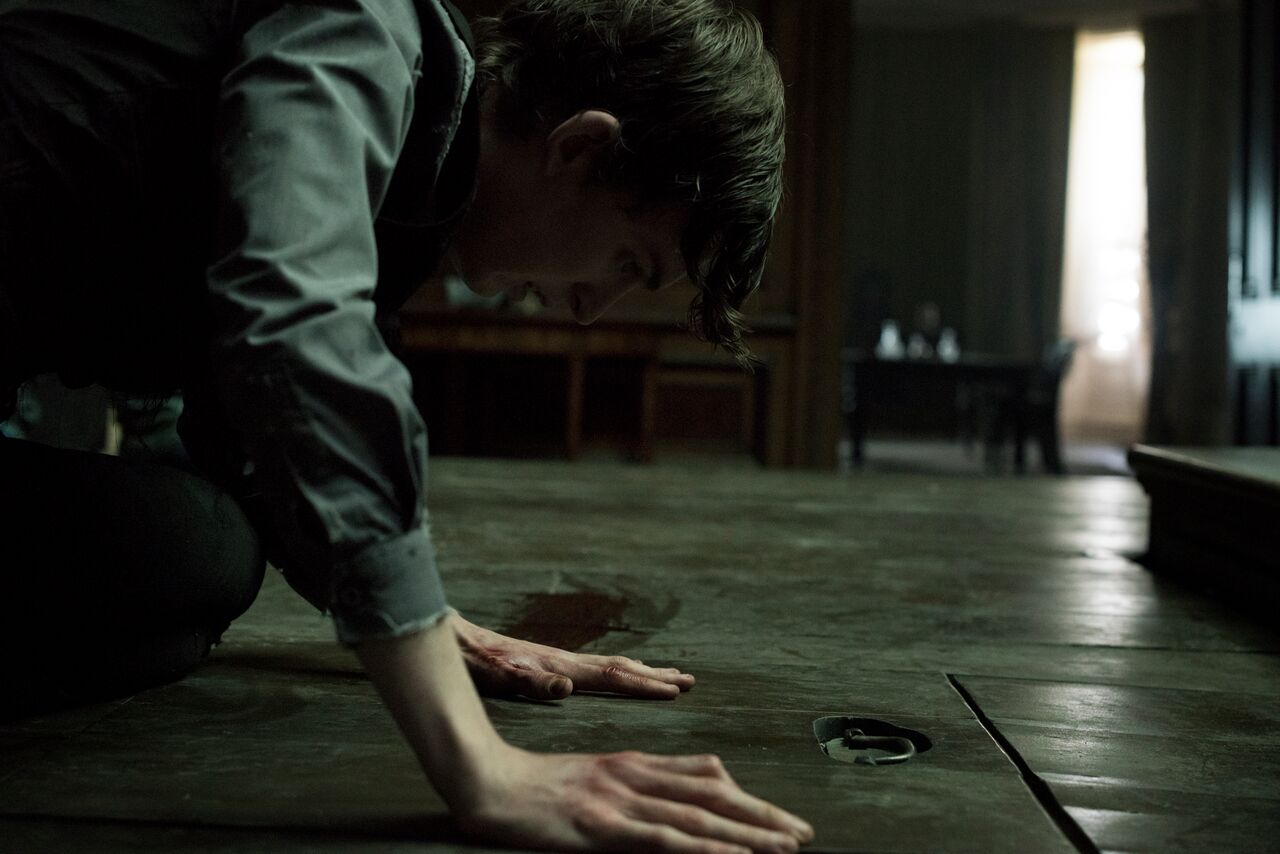The Lodgers – Film Review
Director: Brian O’ Malley
Starring: Charlotte Vega, David Bradley, Eugene Simon and Bill Milner
Release Date: 9 Mar
As the camera pans across overcast skies and dead autumn leaves in the opening minutes of The Lodgers, it makes a series of jump cuts in an effort to highlight its intentions. Sleeping beside a murky lake is a pale young woman in a deathly sleep, the wind whipping at the pages of her abandoned notebook. The director takes a moment to languish over the quintessentially Irish landscape, looking decidedly grey. And finally, moments later, we settle on a practically unmarked gravestone. Only the year is legible. 1916.

It’s a powerful opening that betrays both the writer’s influences (gothic romance novels of the 19th and early 20th century) as well as his political agenda (national tension with the British colonizers). It’s a comfortable pairing, considering what a horrific moment in history that the film is set in.
The story itself focuses on Rachel (Vega), a young woman living with her twin brother in a practically derelict Big House in rural Ireland. Her time is spent on the grounds, walking back and forth to the nearest crossroads-of-a-village for groceries and gazing out of windows. It’s clear that Rachel is tethered to her home by some invisible force or obligation, which she quietly struggles with. Her brother Edward (Milner), who spends most of his time watching her while lingering in dark corners, has no such dilemma. It is only with the arrival of the grocer’s son, Sean (Simon), that this tension is suddenly aggravated, awakening something sinister and unnatural beneath the grounds.

Referring to Loftus Hall as a grim setting is a wild understatement. It’s a barely habitable wreck of a building, pointedly cold and uninviting. A particularly nice touch to this atmosphere is the figure of Jesus Christ on the stairwell, standing with his back to the rest of the house. Even the master bedroom, lavished with red velvet drapes, is more bleeding heart than hearth and home. It’s a desolate location. It makes Hill House from The Haunting seem like a top rated property on AirBnB.
This setting is aptly complemented with a conga line of gothic imagery, some far more effective than others. An early scene involving a bird cage is markedly macabre, evoking the spectre of Edgar Allen Poe. And a pivotal reveal in the third act has the potential to give audiences goosebumps. However, another moment at the dinner table is a painfully missed opportunity. It doesn’t have the courage to properly build suspense before the premature payoff. All in all, it’s these moments that are the most memorable, far more than the more supernatural elements.

Ghostly images by the lake and the leakiest cellar in film history are all very notably ‘Hollywood’, but are clearly at odds with the minimalist stylings of this Irish genre film. There is an earnest tendency to fall back on standard horror tropes, with the aim of delivering a satisfying climax for international audiences. Unfortunately, despite lofty ambitions, this results in the opposite effect. The finale is a standardised ghost-train ride of spectacle, hampered by obvious budget constraints and delivers a comparatively cookie-cutter ending that we have all seen many times before.
It’s a shame because The Lodgers gets off to a stellar start with its politically charged subtext and a strong performance from its leading lady. With a relatively bare-bones plot, much of the film rests on Vega’s shoulders and she fully delivers both an engaging and believable presence throughout. Ghosts and hammy dialogue typically go hand-in-hand. To Vega’s credit, she handles her lines professionally, making the fantastic easily accessible. She is a perfect representative of nationalist tension, part of an Anglo-Irish family that simultaneously shuns and yearns for acceptance into the community. She squirms in her own personal limbo, silently screaming as she brushes her hair in the dusty mirror. It’s a complicated relationship that invites multiple interpretations and is easily the most intriguing aspect of the film as a whole.

The rest of the cast are something of a mixed bag. Deirdre O’ Kane and David Bradley are the biggest names attached. Considering they are plunged into a genre they are in no way acclimatised to, they do a surprisingly good job. It is jarring to see them grim-faced and serious at first, but there’s no denying the talent on display.
The two male leads however, are a little lacking in colour. Neither Eugene Simon nor Bill Millner does a particularly bad job, but there’s very little that makes them pop from the screen. This is somewhat understandable with Sean, the grocer’s son/wounded soldier who has bland practically written into his character. But Edward is essentially the Norman Bates of this story. It’s a role that demands range and charisma. He is given plenty of opportunities to shine and he rarely does more than shimmer. Much like the finale, he’s a missed opportunity.
The Lodgers is a relevant film within Irish cinema, but it doesn’t quite hold it all together as a cinematic experience. There’s a clear love of the genre on display here, but the thin story and reliance on standard horror tropes in the final act ultimately overshadows the gothic atmosphere that the film works hard to achieve. It is a tough blow that is only partially softened by the strong lead performance and the occasionally thought-provoking subtext.
Score: 3/5
Written by Stephen Hill
